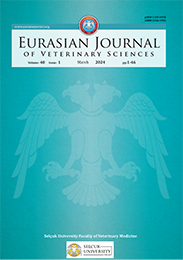| 2020, Cilt 36, Sayı 1, Sayfa(lar) 008-015 | |
| [ Özet ] [ PDF ] [ Benzer Makaleler ] [ Yazara E-Posta ] [ Editöre E-Posta ] | |
| Comparative efficacy of propofol and clove oil as sedatives in transportation of Jack Dempsey fish (Rocio octofasciata) | |
| Tuba Özge Yaşar, Çetin Yağcılar, Mehmet Yardımcı | |
| Namık Kemal University, Faculty of Veterinary Medicine, Değirmenaltı Campus, 59030 Süleymanpaşa, Tekirdag, Turkey | |
| Keywords: Aquarium fish, respiratory rate, sedation | |
| Abstract | |
Aim: The aim of this research was to examine the efficacies of propofol
and clove oil to decrease the metabolic activity during transportation
in order to determine optimal protocols for sedation of fish. Materials and Methods: 126 Jack Dempsey fish were used in this research. Control (n:42), propofol (n:42) and clove oil (n:42) groups placed into closed clear plastic fish bags filled with three litres of oxygen per litre of water and supplemented with 0.1 ml/L of propofol and clove oil. Respiratory rates, induction and recovery times, feed intake and color-changing times were measured while reactions to light, vibration and touch were scored for sensitivity controls. Results: According to the results, the decrease of respiratory rates per minute (67.26 ± 6.3, 50.26 ± 9.4, 36.52 ± 4.6, 11.74 ± 4.8, 7.10 ± 3.5, 4.50 ± 2.2, 3.69 ±1.5) and recovery time respiratory rates (frequency per minute) of the propofol group (80.12 ± 1.84) differed from the control and clove oil groups (p ? 0.05). Regarding the sensibility controls, propofol group was less sensible to light, vibration and touch. Conclusion: Considering its low cost and easy availability, since propofol has been found to be more suitable and clove oil was more ineffective than propofol, therefore propofol can be recommended as a priority in the transport of aquarium fish. |
|
| [ Başa Dön ] [ Özet ] [ PDF ] [ Benzer Makaleler ] [ Yazara E-Posta ] [ Editöre E-Posta ] | |




